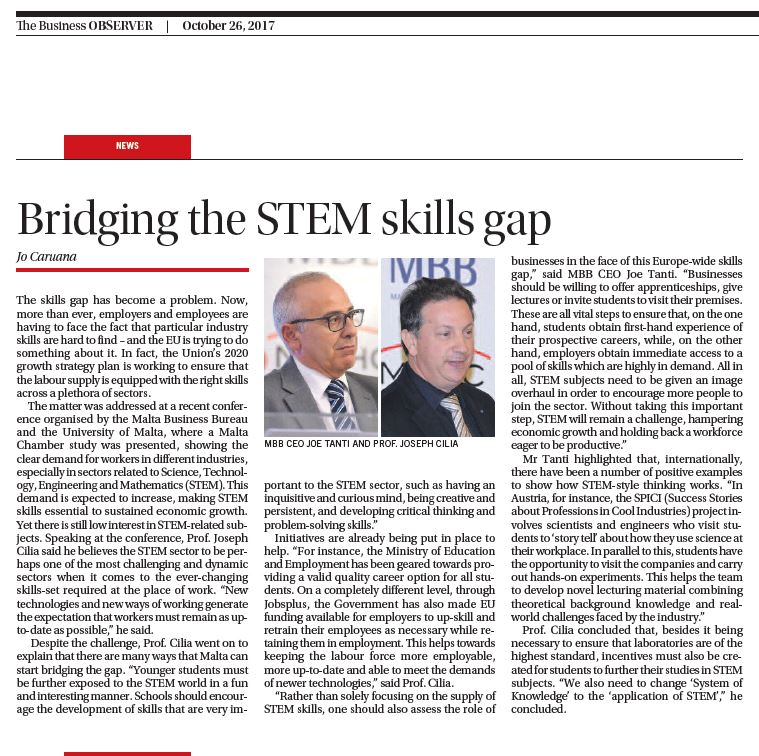Bridging the STEM Skills Gap
- MBB News, Media, Press Releases
- MBB News, Media, Press Releases


Skills gaps have become very evident in particular industries, and particularly those related to Science, Technology, Engineering and Mathematics (STEM). Here, Jo Caruana speaks to Head of National Skills Council Prof Joseph Cilia and MBB CEO Joe Tanti to discover what can, and is, being done about it.
The skills gap has become a problem. Now, more than ever, employers and employees are having to face the fact that particular industry skills are hard to find – and the EU is trying to do something about it. In fact, the Union’s 2020 growth strategy plan is working to ensure that the labour supply is equipped with the right skills across a plethora of sectors.
Locally, at a recent conference organised by the Malta Business Bureau and the University of Malta, the matter was also addressed. In fact, a Malta Chamber study was presented that shows the clear demand for workers in different industries for the next five years, namely in the sectors related to Science, Technology, Engineering and Mathematics (STEM). This demand is expected to increase, making STEM skills essential to sustained economic growth. Yet there is still low interest in STEM-related subjects.
Speaking at the conference, Prof Joseph Cilia believes the STEM sector to, perhaps, be one of the most challenging and dynamic sectors when it comes to the ever-changing skills-set required at the place of work. “New technologies and new ways of working generate the expectation that workers must remain as up-to-date as possible,” he says.
“Businesses should be willing to offer apprenticeships, give lectures or invite students to visit their premises”
But despite the challenge, the professor goes on to explain that there are many ways that Malta can start bridging the gap. He suggests that, “younger students must be further exposed to the STEM world in a fun and interesting manner.” He continues, “while it is understandable that they promote all areas of studies and career options, schools are critical in the development of skills that are very important to the STEM sector, such as having an inquisitive and curious mind, being creative and persistent, developing critical thinking and problem-solving skills.”
And initiatives are already being put in place to help. “For instance, the Ministry of Education and Employment has been geared towards providing a valid quality career option for all students. On a completely different level, through Jobsplus, the government has also made available EU funding for employers to up-skill and retrain their employees as necessary while retaining them in employment. This helps towards keeping the labour force more employable, more up-to-date and able to meet the demands of newer technologies,” says Prof Cilia.
MBB CEO Joe Tanti stresses that, “rather than solely focusing on the supply of STEM skills, one should also assess the role of businesses in the face of this Europe-wide skills gap. Businesses should be willing to offer apprenticeships, give lectures or invite students to visit their premises. These are all vital steps to ensure that, on the one hand, students obtain first-hand experience of their prospective careers, while, on the other hand, employers obtain immediate access to a pool of skills which are highly in demand.”
He continues, “all in all, STEM subjects need to be given an image overhaul in order to encourage more people to join the sector. Without taking this important step, STEM will remain a challenge, hampering economic growth and holding back a workforce eager to be productive”.
Mr Tanti highlights that, internationally, there have been a number of positive examples to show how STEM-style thinking works. “In Austria, for instance, the SPICI (Success Stories about Professions in Cool Industries) project involves scientists and engineers who visit students to ‘story tell’ about how they use science at their work.”
Pushing for developments in this sector, Mr Tanti explains: “In parallel to this, students have the opportunity to visit the companies and carry out hands-on experiments. This helps the team to develop novel lecturing material combining theoretical background knowledge and real-world challenges faced by the industry.”
Professor Cilia believes that, besides it being necessary to ensure that laboratories are of the highest standard, incentives must also be created for students to further their studies in STEM subjects. He concludes, “we also need to change ‘System of Knowledge’ to the ‘application of STEM.”
Share this article on socials:
25+ years of powering business excellence.
Related
More related news.
March 8, 2024
- Latest News, MBB News
Businesses Discuss EU Textile and Food Waste Measures
February 18, 2024
- Latest News, MBB News
Right balance needed in EU late payments
July 19, 2023
- Latest News, MBB News

